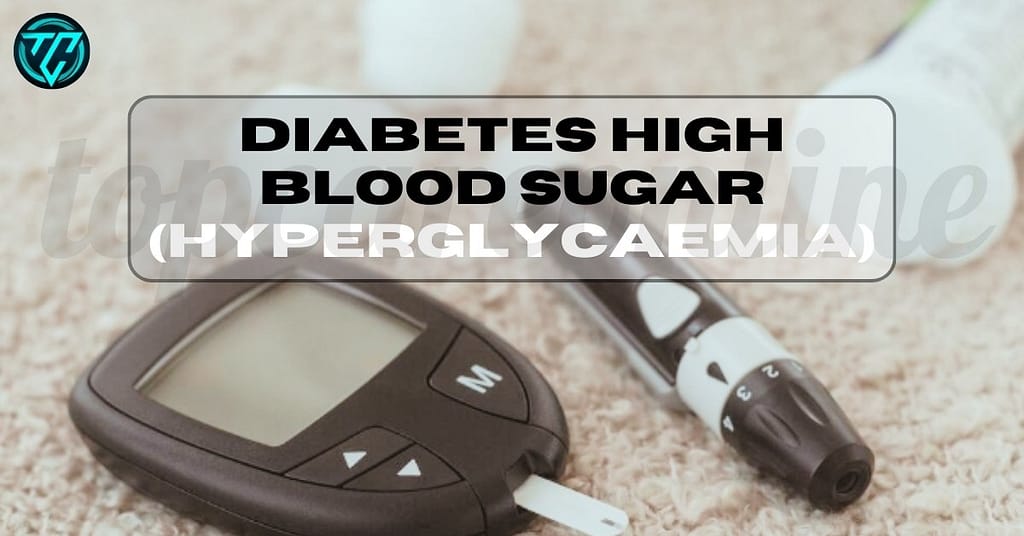Have you ever experienced high blood sugar levels without being diagnosed with diabetes? 🤯
Many assume high blood sugar is always a sign of diabetes, but what causes high blood sugar without diabetes is a question with a surprising number of answers. We’ll explore the reasons behind elevated blood sugar in non-diabetic individuals and provide valuable insights on how to manage and prevent these spikes.
What is High Blood Sugar
High blood sugar, also known as hyperglycemia, refers to elevated glucose levels in the blood. While it’s a common hallmark of diabetes, non-diabetics can also experience hyperglycemia. Normal blood sugar levels typically range between 70-100 mg/dL (fasting). Anything beyond this threshold can be classified as high blood sugar, and if left unmanaged, it can lead to a variety of health issues.
High Blood Sugar Range
Here’s a breakdown of blood sugar levels before and after eating:
Before Eating (Fasting):
- Normal: Below 100 mg/dL (5.6 mmol/L)
- Prediabetes: 100-125 mg/dL (5.6-6.9 mmol/L)
- Diabetes: 126 mg/dL (7.0 mmol/L) or higher on two separate tests
After Eating (Postprandial):
- Normal: Less than 140 mg/dL (7.8 mmol/L) two hours after eating
- Prediabetes: 140-199 mg/dL (7.8-11.0 mmol/L) two hours after eating
- Diabetes: 200 mg/dL (11.1 mmol/L) or higher two hours after eating
If levels are consistently high, it’s important to consult a healthcare provider.
What Causes High Blood Sugar Without Diabetes
Let’s break down some of the key factors that can lead to high blood sugar without diabetes:
1. Stress
One of the most common reasons for high blood sugar is stress. When your body is under stress—be it physical, emotional, or mental—it triggers the release of hormones such as cortisol and adrenaline. These hormones are part of your body’s “fight or flight” response, and they can cause a spike in blood sugar levels to give you more energy. If you’re frequently stressed, this can lead to consistently elevated blood sugar.
2. Poor Diet
While it’s well-known that sugary foods cause spikes in blood glucose levels, other dietary factors can contribute too. High carbohydrate intake, lack of fiber, and excessive consumption of processed foods can lead to high blood sugar even if you’re not diabetic. Carbohydrates break down into glucose, and without adequate fiber to slow absorption, your blood sugar levels can quickly rise.
3. Lack of Physical Activity
Physical activity helps your body use insulin more effectively and manage glucose levels. If you’re leading a sedentary lifestyle, your body may not be able to regulate blood sugar levels well. Lack of exercise can reduce your muscle’s ability to absorb glucose, resulting in higher blood sugar levels.
4. Medications
Certain medications, like steroids, beta-blockers, and diuretics, can interfere with the body’s ability to manage blood sugar, even if you don’t have diabetes. These medications can impair insulin’s effectiveness or trigger the liver to release more glucose into the bloodstream, leading to high blood sugar without diabetes.
5. Hormonal Imbalances
Conditions like polycystic ovarian syndrome (PCOS) and Cushing’s syndrome are often linked to high blood sugar. Hormonal imbalances can affect how your body handles insulin, making it harder to maintain normal blood sugar levels.
6. Sleep Deprivation
A lack of sleep can also lead to high blood sugar levels. When you don’t get enough sleep, your body becomes more insulin-resistant, making it harder to regulate glucose levels. Research shows that even one night of poor sleep can cause a spike in blood sugar, so maintaining good sleep hygiene is essential.
7. Infections or Illnesses
When your body is fighting an infection or dealing with an illness, it may release hormones to combat the issue. These hormones can cause your liver to release extra glucose into your bloodstream, leading to higher-than-normal blood sugar levels, even if you’re not diabetic.
Symptoms of High Blood Sugar
Recognizing the symptoms of high blood sugar is crucial for timely management. Common symptoms include:
- Increased thirst: You may feel very thirsty and drink more fluids than usual.
- Frequent urination: You may find yourself needing to urinate more often.
- Fatigue: A feeling of tiredness or lack of energy is common.
- Blurred vision: High sugar levels can affect your eyesight temporarily.
- Headaches: You might experience frequent headaches.
- Hunger: You may feel hungrier than normal, even after eating.
- Dry mouth: A persistent dry mouth can occur.
- Slow healing: Cuts and wounds may take longer to heal.
- Unexplained weight loss: This can happen, especially if you have undiagnosed diabetes.
If you experience these symptoms consistently, it’s important to consult a healthcare professional for evaluation and management.
How to Prevent High Blood Sugar
- Dietary Changes: Focus on a low-glycemic diet. Incorporate whole grains, fiber-rich foods, and lean proteins into your meals. Reducing the intake of processed sugars and simple carbs will go a long way in preventing blood sugar spikes.
- Exercise Regularly: Engaging in regular physical activity is crucial to maintaining balanced blood sugar levels. Aim for at least 30 minutes of moderate exercise daily, such as walking, cycling, or swimming.
- Stay Hydrated: Make sure to drink plenty of water throughout the day. Staying hydrated helps your body maintain healthy blood sugar levels and prevents the concentration of glucose from rising.
- Manage Stress: Incorporate stress-management techniques into your daily routine. Activities like meditation, yoga, deep breathing exercises, and even hobbies can help lower cortisol levels and prevent stress-induced hyperglycemia.
- Check Medications: If you’re on medication, especially steroids, consult your doctor to understand how it might be affecting your blood sugar levels. There may be alternative options that don’t cause spikes in glucose.
By understanding the causes and taking preventive measures, you can avoid the harmful effects of high blood sugar and lead a healthier, more balanced life. 🌿







